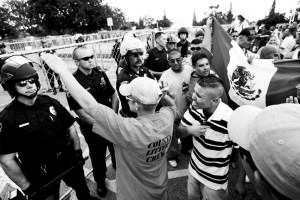The national discussion we’re having about the tenor of Donald J. Trump’s political rallies and the protests that have erupted into violence have turned an interesting corner.
We hear from the Trumpsters that the protesters are drowning out their Republican presidential candidate’s right to be heard. It’s guaranteed in the First Amendment, they say.
The pro-protest crowd responds by saying they, too, are granted First Amendment protection and their protests are every bit as valid as the candidate’s right to speak.
Ahhh, this takes me back a few years to a fantastic moment in modern Amarillo history.
The year was 2006. The Ku Klux Klan wanted to stage a rally in front of City Hall. The city administration decided — on the advice of counsel — that the KKK was entitled to stage its rally. (My memory is a bit foggy at the moment, as I can’t remember the reason for the rally.)
So the Klan got its permit. The Amarillo Police Department deployed in force to ensure that violence didn’t break out. Even the t hen-chief of police, Jerry Neal, was decked out in his blues and all the hardware that beat cops wear when they’re on patrol. I’d never seen the chief “in uniform.”
I went to the rally to see it for myself.
But just as the rally was about to begin and when the leader of the Klan outfit took his place at the microphone, a counter protest comprising a crowd of a couple hundred showed up on the parking lot.
And man they were loud.
They were clanging cymbals, banging drums, shouting at the top of their lungs. Heck, there might even have been a horn or two in the procession.
Who was leading the counter protest? None other than the late millionaire eccentric Stanley Marsh 3. He was decked out in his customary white suit reminiscent of something out of Col. Sanders’ closet.
Fortunately, and I guess the police presence had much to do with it, there was no violence. The Klan guy tried to talk above the din. He gave up shortly afterward. The Klansmen departed the podium area and soon left the area.
Meanwhile, the Marsh-led counter protesters declared some form of victory that they were able to shout down the Ku Klux Klan.
I don’t recall then much argument in the community about whether the counter protest violated the other side’s right to be heard.
I do, though, recall having this visceral feeling of relief that the counter protest occurred, that the Klan was unable to spew its message — whatever it was — and that no one got hurt.
None of it bothered me in the least, as I had no particular interest in hearing what the Klan had to say in the first place.
